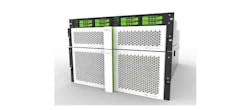Aquari Open-Scale Storage System is a self-healing storage system capable of scaling to exabytes of usable capacity. Concurrent says that initial deployment takes a few hours, while additional nodes can be added in less than 30 minutes.
Aquari uses the open source Ceph storage engine and a proprietary storage-optimized, real-time Linux OS. It supports native, high-performance distribution interfaces for Ceph RADOS objects and block protocols, as well as other file and object protocols, including NFS, CIFS, S3 and Swift. Additionally, Aquari features a shared-nothing architecture with no single point of failure. Concurrent says this guarantees data is always available.
Any active data requiring high-level performance is stored on flash-based nodes using a replication model. As data becomes less active, it is tiered to capacity nodes using hard drives. These nodes support speed of replication or efficiency of erasure coding to protect against drive and node failure.
Concurrent also points out that new nodes can be added to increase capacity and performance without downtime. Failed nodes and components, like hard drives, can be easily replaced without impact to applications or end-users.






